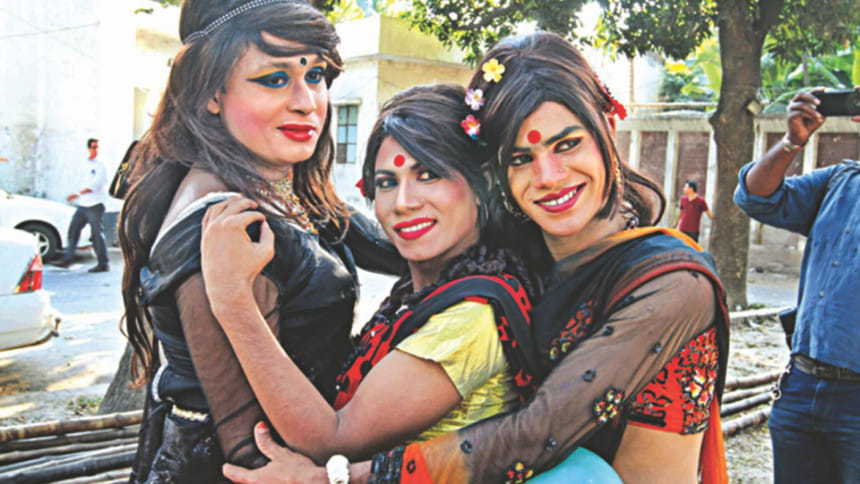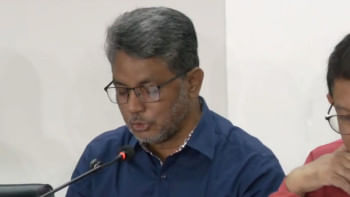Celebration of the third gender

Hijras or transgenders have a special place in South Asian history as semi-sacred people and this culture prevails in India, some parts of Sri Lanka, Pakistan and Bangladesh. They hold an ancient association with a Hindu goddess of fertility to which they are said to sacrifice their own fertility for the sake of others. By becoming eunuchs, Hijras become semi-sacred, and can bless the health and fertility of newlyweds and newborns.
The special role of eunuchs is an ancient one and was recorded in Pharoanic Egypt thousands of years ago, though at that time transgendered people were associated with the occupation of the royal guard. Eunuchs were utilised as royal guards in several Islamic societies of Asia, most recently in that of the Moguls. Some gained repute as soldiers and important political persona within the Mogul courts. Eunuchs and other specifically named gender-altered roles also served as entertainers and sex workers in numerous societies throughout Western and Southern Asia for many centuries.
Gradually, with the decline of Mogul political control in India, Hijras too lost their social position. Many joined the homes of minor royalties as cooks and other domestic workers, and a few inherited properties in that way. With the outlawing of their traditional surgical practices by the British in the late 1800s, they were criminalised and further marginalised from the society.
In Bangladesh, the old respected role of blessing newlyweds and newborns has been kept alive in some traditional rural communities and in Old Dhaka, among the oldest, indigenous families. In this tradition, Hijras are paid in cash and food, on the occasion of a household party, to sing, dance and bless a newly married couple or a newborn. In addition, Hijras have a traditional right to demand food for free at markets, called badai khata, a type of demand not interpreted as begging. Due to their semi-sacred aura and social ambiguity (being neither male nor female), they are able to command a certain respect, heavily mixed with fear, among the general populace. The earnings gained through these traditional roles are pooled through the guru system, to create a degree of social and economic safety for all.
Today, the financial gains from such modes of income are poor, and urban Hijras have increasingly become sex workers, a fact they decidedly do not like the general public to recognise, as it would destroy their capacity to do badai khata. Modern Hijras in Bangladesh are not all eunuchs, though true gurus definitely are.
Among Hijras in Bangladesh today, there is a considerable variety of gender presentation, personal identity and practice. The social identity of a Hijra is based on a commitment to the Hijra way of life, i.e. allegiance to a guru, to the pooling of earnings and submission to group rules. Their own communities, cantered on their gurus, are the social worlds in which they live and protect themselves from the extremely marginalised position they hold in our society today. In Bangladesh it has a very rich history which is over 200 years old.
Bandhu Social Welfare Society (BSWS) as well as some other organisations have been working on improving health and rights of the Hijra population for the past two decades. The Ministry of Social Welfare (MOS) has also taken a number of initiatives as a part of its better livelihood programme. Under its Safely Net Programme, the ministry has also allocated funds to the welfare of transgendered people in the national budget from 2013. As a part of the Policy and Advocacy initiative, over the last couple of years BSWS has been actively working with government of Bangladesh and other relevant stakeholders on issues around health and human rights of the Hijra population.
Acknowledging Hijras as a third gender in November 2013 was a landmark decision made by the government of Bangladesh. The Hijra community was looking forward to celebrate the day in collaboration with the Government of Bangladesh, as they called upon the civil society and community based organisations to celebrate the very day of their gender recognition.
BSWS, along with the Ministry of Social Welfare and UNAIDS, therefore, organised Hijra Pride 2014 to commemorate the day of third gender recognition for the Hijra community with graceful support of its development partners at divisional and central levels. A number of community based organisations, including Sustha Jibon, Shomporker Noya Shetu and Rupbaan, collaborated with BSWS to make this event a huge success.
The central consultation session also designed a way forward with specific recommendations, terming it as the "Dhaka Declaration" with a view to addressing and establishing human rights issues of the Hijra community and placing them in a position where they will be able to add value to the society and its growth with dignity and honour.
The objectives include creating awareness among the Hijra community through training to engrave a respectful image of their thousand years of tradition and culture so that a positive notion is created among the general population. Ways to train the said community to groom themselves in terms of attitude and etiquette to make them more acceptable in the society were also discussed. Apart from that, the sessions also called for the need to identify the number of Hijras in Bangladesh through a census.
The National Parliament of Bangladesh has also decided to take necessary initiatives for the constitutional recognition of transgendered people to uphold their human and constitutional rights. Advocacy efforts will be made with the government to develop short term and long term development plans, engaging with the transgender community, NGOs, UN agencies and civil society representatives.
It is imperative to create employment opportunities for the transgender community. The session also stressed on the need to hire competent individuals from Hijra community, who have expertise in different formal and informal sectors and take capacity building initiatives for a better livelihood for them. Civil society organisations and donors, under the leadership of the Ministry of Social Welfare, should, and we believe, will work more closely to promote and create employment opportunities for at least one Hijra in each NGO.
The need to incorporate hijra issues in formal education curriculum and create opportunity of formal and informal education for those within the Hijra community was also discussed. Moreover, as put forth by the session, there is an urgent need to accelerate the civil society movement on "discrimination reduction law" to support all minority communities of the country.
Social campaign, mobilisation and effective participation need to be strengthened towards sensitising family members to bring their children who embrace the Hijra identity close to the family. In order to do that, media sensitisation initiatives need to be strengthened by involving journalists in programme activities to stop the misrepresentation of Hijra communities in media. Advocacy efforts will also be made for incorporating the issues of sexual minority communities in the government sector programme for Child and Maternal Health.
Transgendered people had been given a special place in our history and culture since time immemorial. It's now our turn to reintegrate this group into the mainstream by granting them the rights to enjoy the freedoms enjoyed by the citizens of this country.
The writers are Deputy Director-Programme of BSWS, and Communication Specialist of BSWS, respectively.

 For all latest news, follow The Daily Star's Google News channel.
For all latest news, follow The Daily Star's Google News channel. 



Comments